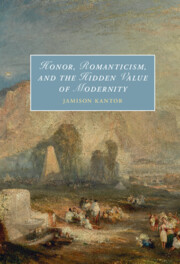Book contents
- Honor, Romanticism, and the Hidden Value of Modernity
- Cambridge Studies in Romanticism
- Honor, Romanticism, and the Hidden Value of Modernity
- Copyright page
- Contents
- Figures
- Acknowledgments
- Introduction
- Chapter 1 Soliloquies in Praise of Chivalry
- Interlude
- Chapter 2 “Say, What Is Honour?”
- Chapter 3 Full Faith and Credit
- Interlude
- Chapter 4 Black in Character as in Complexion
- Postlude
- Notes
- Bibliography
- Index
- Cambridge Studies in Romanticism
Chapter 3 - Full Faith and Credit
Honor, Finance, and the Neofeudal Utopia in Scott and Austen
Published online by Cambridge University Press: 23 February 2023
- Honor, Romanticism, and the Hidden Value of Modernity
- Cambridge Studies in Romanticism
- Honor, Romanticism, and the Hidden Value of Modernity
- Copyright page
- Contents
- Figures
- Acknowledgments
- Introduction
- Chapter 1 Soliloquies in Praise of Chivalry
- Interlude
- Chapter 2 “Say, What Is Honour?”
- Chapter 3 Full Faith and Credit
- Interlude
- Chapter 4 Black in Character as in Complexion
- Postlude
- Notes
- Bibliography
- Index
- Cambridge Studies in Romanticism
Summary
In the early nineteenth century, honor and disrepute were increasingly synonymous with terms like credit and debt. In Austen’s Emma, credit becomes a primary figure for the broader speculations about the inhabitants of Highbury. Long affiliated with a Whiggish ideology of commerce and its supposed levelling effects, credit, in Austen’s representation, turns out to be an elitist phenomenon, something made available only to those who already have honor, members of a “neofeudal” vanguard such as George Knightley, who can distribute credit at their discretion. However, Scott’s Rob Roy seems to rebuff Austen’s approach to credit and honor. Featuring a young protagonist who throws himself into the 1715 Jacobite uprising, rescues errant bills of credit from his father’s stock-brokerage, redeems family honor, and tries to impress his love interest, the novel at first appears to be an ideal neofeudal text, blending chivalric romance with modern commerce. But Rob Roy himself challenges the merger of these two paradigms. By decoupling honor from credit and disrupting the financialization of social value, the highlander becomes an unlikely scourge of incipient global finance capitalism.
- Type
- Chapter
- Information
- Honor, Romanticism, and the Hidden Value of Modernity , pp. 76 - 100Publisher: Cambridge University PressPrint publication year: 2023

